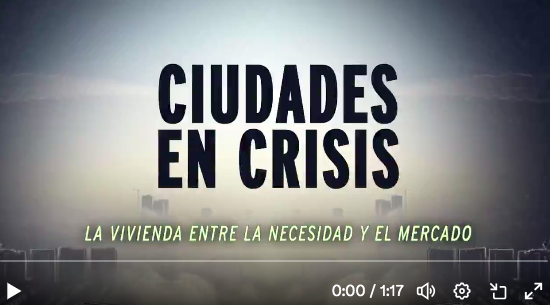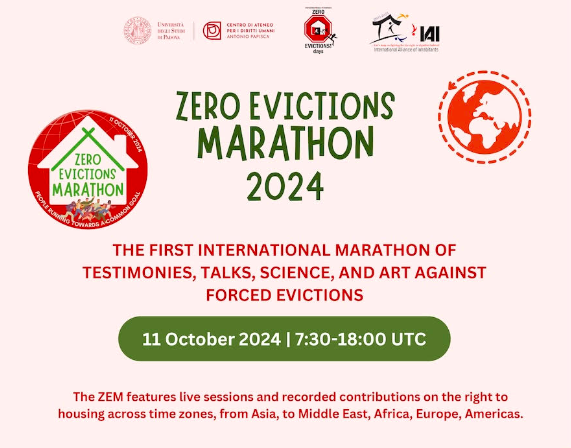Environmental justice is a fundamental goal that cuts across human rights related to habitat, which is why one of our coalition’s main areas of work is habitat and environment. This World Environmental Day we share an overview of HIC’s actions to raise awareness, exchange knowledge, advocate and defend habitat-related human rights in the face of the climate crisis.
The normative framework to protect the environment is constantly evolving to meet growing demands from the social base. In 2022, the UN General Assembly finally recognized the human right to a clean, healthy, and sustainable environment, but this was just an initial framework to achieve environmental sustainability through advancing social justice. The impacts of climate change most affect urban residents in precarious housing and living conditions, making it critical to draw a clear connection between climate justice, housing and habitat.
HIC has advanced this connection in the last few years, making a case for climate justice as a habitat-related human right, the importance of community-led and grassroots responses to assessing losses and damages and developing adaptation measures, among others.
How HIC is advancing climate justice
1. Articulating the intersection: what does climate justice have to do with habitat-related human rights?
In 2021, HIC highlighted that climate justice needs to be treated and enacted as a fundamental habitat-related human right.
——————————————————————————————————————————————————————————————————————————————————————————–
With a Declaration from our then President, Adriana Allen, our coalition launched a joint call for climate justice, articulating equality, human rights, collective rights, and historical responsibilities for climate change as an urgent political and ethical issue.
|
———————————————————————————————————————————————————————————————————————————————————————————-
2. Localising climate justice: highlighting community action and calling for concrete local and global impacts
Communities are at the forefront of addressing the consequences of climate change. Together HIC members have been surfacing the valuable knowledge of local communities and grassroots approaches to remedying the consequences of economic globalisation, rampant urbanisation, wealth disparities, corporate capture of public policy, degradation of the natural world, related pandemics, global warming, conflict, occupation and war.
——————————————————————————————————————————————————————————————————————————————————————————–
| From local responses to international debate – HIC Latin America’s work in climate justice
In order to strengthen the exchange of experiences, alliance building and coordination between social actors from Latin America and other regions working for human rights linked to habitat to advance climate justice, the Habitat International Coalition (HIC) for Latin America held a hybrid forum on 15 and 16 November, 2023, at the Miguel Agustín Pro Juárez Human Rights Centre in Mexico City. Different HIC member organisations and allies participated in the meeting: Cooperación Comunitaria, CEAPI, Plataforma Global por el Derecho a la Ciudad, Red Hábitat and the International Institute for Environment and Development (IIED), as well as invited experiences from Chile, Colombia, Costa Rica, Ecuador, El Salvador, Peru and Mexico. The forum promoted a space for strategy-building for environmental justice between participant organizations, as well as for the documentation and sharing of locally-led practices in rural and urban areas committed to advancing environmental justice through a habitat rights perspective. |
——————————————————————————————————————————————————————————————————————————————————————————–
To advance environmental justice, commitments and action frameworks have to be grounded on local knowledge and practices being led by local community organizations, providing means to support these locally-led actions so as to mitigate and remedy the impacts of climate change through a framework that is also committed to social and territorial justice and deepening of democracy.
——————————————————————————————————————————————————————————————————————————————————————————–
This is how 6 HIC members are advancing climate justice in their local contexts:
|
——————————————————————————————————————————————————————————————————————————————————————————–
3. Learning about climate justice: cross-regional exchange and civil society strategies
We learn best by learning together and from each other. In October 2023, 124 HIC members spent four online sessions learning and excahnging about climate justice, legal frameworks, community actions and defining strategies in response.
——————————————————————————————————————————————————————————————————————————————————————————–
| Stay tuned for the release of our podcasts on the climate justice co-learning space to be released this June! |
——————————————————————————————————————————————————————————————————————————————————————————–
When listening to it you will learn about and understand approaches to climate change, climate justice, and the necessary steps to advocate for meaningful climate solutions that address the intersecting issues of justice, equity, and human rights. In addition, this podcast calls for collaborative action, joint participation, and the need to create a cross-regional advocacy agenda.
4. Quantifying loss and damage: impacts of habitat-related human rights violation amidst environmental hazards and climate change
HIC’s Housing and Land Rights Network (HIC-HLRN) seeks to produce tools and techniques to identify, organize and reflect on experience toward learning and capacity building for problem-solving and related advocacy. With this aim HLRN joined HIC member Habitat Defenders in March 2024 in a workshop in Kampala-Mengo, Uganda focusing on Climate Justice, Human Rights and qualifying Climate Change impacts.
Drawing on its Violation Data Base, HICs Housing & Land Rights Network (HLRN), has released two important reports:
——————————————————————————————————————————————————————————————————————————————————————————–
| 2022: In Pursuit of Climate Justice: Housing and Land Rights Violations in the context of Environmental Hazards and Climate Change
This report offers a simple typology of causative categories contributing to housing and land rights violations in the context of climate change, with a view to preventing and remedying such hazards, crises and disasters toward achieving climate justice for all. The 12 categories include: conflict situations, cross-border effects, development-induced displacement, environmental racism/discrimination, extractivism, governance, industrial pollution/contamination, large-scale agriculture/livestock farming, megaprojects, neglect, tourism and other human factors. |
——————————————————————————————————————————————————————————————————————————————————————————–
——————————————————————————————————————————————————————————————————————————————————————————–
| 2023: Counting Costs, Loss & Damage: Quantifying Impacts of Habitat-related Human Rights Violations amid Environmental Hazards and Climate-change
This report supplements cases reported from the Violation Database on World Habitat Day 2022 of habitat human rights violations resulting from environmental and climate events that have caused deprivation of adequate housing and the equitable and sustainable access to, use of and control over land. It presents available data quantifying the consequences of such violations in the context of environmental hazards and climate change. |
——————————————————————————————————————————————————————————————————————————————————————————–
What’s next?
Environmental justice is a key area for our Coalition and HIC supports all the work being done by civil society to fight for and claim the right of all people to live in a safe, peaceful and dignified place, which means a clean and healthy environment.
Share with us any initiatives that are happening in your town, city or region to claim our human rights related to habitat and climate justice. And don’t miss the soon-to-be-released podcast, compiling the conversations and exchanges from the climate justice co-learning space!


